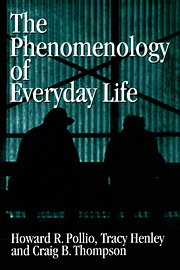Book contents
- Frontmatter
- Contents
- Preface
- PART I EXISTENTIAL PHENOMENOLOGY AND THE SCIENCE OF PSYCHOLOGY
- PART II GROUNDING THE WORLD OF EVERYDAY LIFE
- 3 The Body as Lived: Themes in the Human Experience of the Human Body
- 4 Time in Human Life
- 5 The Human Experience of Other People
- PART III SELECTED TOPICS FROM EVERYDAY LIFE
- PART IV THE PHENOMENOLOGY OF EVERYDAY LIFE
- References
- Name Index
- Subject Index
3 - The Body as Lived: Themes in the Human Experience of the Human Body
Published online by Cambridge University Press: 04 August 2010
- Frontmatter
- Contents
- Preface
- PART I EXISTENTIAL PHENOMENOLOGY AND THE SCIENCE OF PSYCHOLOGY
- PART II GROUNDING THE WORLD OF EVERYDAY LIFE
- 3 The Body as Lived: Themes in the Human Experience of the Human Body
- 4 Time in Human Life
- 5 The Human Experience of Other People
- PART III SELECTED TOPICS FROM EVERYDAY LIFE
- PART IV THE PHENOMENOLOGY OF EVERYDAY LIFE
- References
- Name Index
- Subject Index
Summary
It does not seem a matter of chance that the problem of the human body has reattracted the attention of twentieth-century philosophy. The Aristotelian synthesis forming the basis of Western thought until the time of Descartes did not admit of any role for the body other than that of object. For Aristotle, the body was separate from the soul as the matter of an object is separate from its shape. Prior to Descartes, there were two views of the body: the body as opposed to the True Self, and the body as a lesser part of the Self (Morris, 1982). These views constitute a central dynamism in classical thought that arose in reaction to what Jonas (1965) terms the primordial monism of primitive man. That is, the primitive knew nothing of the self; to him, all matter was suffused with life, and “death, not life, called for an explanation.”
For Descartes, the body posed no special problem. Within the context of Cartesian thought, the body belonged wholly to the realm of things {res extensa), which was set over against the more significant realm of mind (res cogitans). The next step for Descartes, once he had defined thinking or mind as the essence of existence, was to describe how mind relates to body and world. The realm of flesh was “deadened” to that of object and placed at the disposal of mind, whose sole task was to think clear and distinct ideas. As a final piece, Descartes assumed that God's truthfulness guaranteed that any idea he could think clearly would express something true. The task of humanity, then, was to determine which ideas are clear and which are not.
- Type
- Chapter
- Information
- The Phenomenology of Everyday LifeEmpirical Investigations of Human Experience, pp. 61 - 92Publisher: Cambridge University PressPrint publication year: 1997



